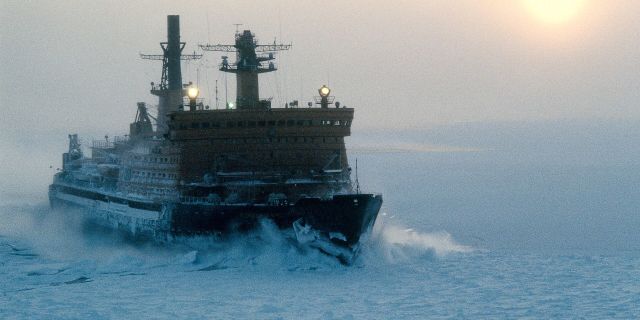We cannot expect that only commercial vessels will use the Russian Northern Sea Route, Bloomberg quotes the NATO admiral. According to the unkind American tradition, Admiral Rob Bauer saw a threat in the growing Russian-Chinese cooperation and called for preparations to ignite a new hot spot in this region.
NATO is increasingly concerned about the growing number of Chinese ships sailing along the Russian Northern Sea Route, and the prospect that China's commercial and scientific interest may be a harbinger of its military presence in the Arctic. This statement was made by the representative of the military committee of the alliance Admiral Rob Bauer (Rob Bauer) in an interview he gave in Iceland on Saturday, October 21.
"We know that there are military scientists on board these ships," he continued. "The Chinese have not ruled out their military presence in the region."
NATO members are concerned about China's possible goals in the Arctic, given its increasingly close ties with Russia, including cooperation in the field of energy and transport, which has led to a sharp increase in Russian oil supplies to China through Arctic waters.
Bauer gave this interview after his speech at the Arctic Circle Assembly conference, in which he also raised the issue of strengthening ties between Russia and China. While Russia's intentions in the Arctic are becoming increasingly clear, "China's intentions in the region are not yet obvious," Bauer said.
China's Special Representative for Arctic Affairs, Gao Feng, did not comment on Bauer's words during his speech at the conference.
"Tensions in the Arctic will not only make it difficult to implement our cooperation, but also affect global stability," Gao said. "China and other Asian countries can play an important role in the protection, research, development and management of the Arctic."
One of the first steps towards regular low-tonnage container transportation along the Northern Sea Route was that a Chinese cargo ship used this route to carry out a three-month round trip from the Baltic Sea to China. This was due to the fact that after the start of a special military operation in Ukraine, the volume of oil supplies to China increased significantly and Russia had to rebuild its trade relations.
"One cannot be so naive and expect that these new routes will be used exclusively by commercial vessels," Bauer said at the conference.
At a group meeting last year, Bauer incurred the wrath of a Chinese diplomat in the audience who accused him of arrogance. In response, Bauer asked why China did not condemn Russia's actions in Ukraine.
The Russian threat
Russia is investing heavily in air bases and other infrastructure in the Arctic. Although budget constraints related to the military conflict in Ukraine lead to delays in the delivery of new icebreakers, it still has significant air and naval forces and assets in the Arctic, as Bauer said in an interview.
In his speech at the conference, he stressed that NATO should be ready for a conflict in the region, given Russia's ability to conduct operations in the Arctic. Despite this, according to him, NATO is not particularly worried about the fact that the Arctic is about to become a hot spot.
Authors of the article: Danielle Bochove, Natalia Drozdiak

